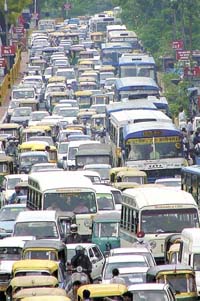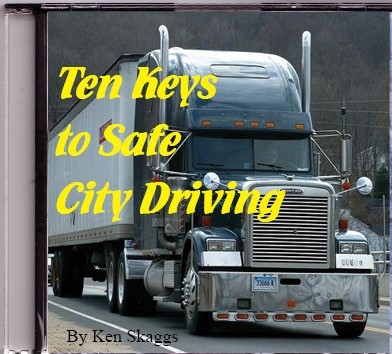The series of events usually goes something
like this; And all because
of a few people in a hurry, who just happened to be next to each other. This illustration,
which happens everyday, is a good example of why it is important to leave room
for error. The trick is, to visualize the flow of traffic,
as a whole, and drive
at or just below
the average speed. You can't see the flow of traffic if you are within fifty
feet of the car
in front of you. Or one hundred feet if there is a truck in front of you. You
need to see well
ahead, otherwise you wont see it. Once you can see the true flow
of traffic, that
is, the average speed of everybody around you, you will then begin to notice
who is trying
to drive faster than the flow. These are the ones who will cause a bottleneck
and mess it up
for all of us, if we're not careful. Give them room because
they are coming
anyway. If you try to contain them, then you are starting that chain of events. Sometimes, when there is a bottleneck happening, I will see a truck staying
back in the lane
that is ending. His intent is right. He understands that all of these
cars that are
trying to squeeze through are just going to cause a bottleneck. And he is trying
to teach them
that they might as well prepare to merge now, instead of trying to cram it
in at the last second,
making everyone stop. However, you can get a ticket for that.(Obstructing traffic).
I know,
it's not fair, but that's the law. And unfortunately, the real culprits will
be getting away.
What we really need is more help from the police, writting tickets for merging
at the last
second and tailgating. Unfortunately, merging at the last second, is not against
the law. But,
you could call it obstructing traffic. That is what they are doing. And tailgating,
is not
only dangerous, it is one of the main causes of bottlenecks and traffic jams.
And when you
give a ticket to one of these me-first people, you should explain what a bottleneck
is, and
how they are the cause of it. And hopefully they will learn something.
This problem
will probably get worse before it gets better. I think what it will really
take to nip bottlenecks
in the bud, is people telling people. If you know someone who has to be five
feet from the
car in front of him to feel like he is getting somewhere, explain to him that
it doesn't matter
if you're five feet or fifty feet from the car ahead of you, you aren't going
to get there
any sooner if you get closer. And for people who have to merge at the last
second, tell them
to learn math. Passing a few more cars, that are probably going to exit soon
anyway, doesn't
save you any more time than the time it takes to drive a few car lengths. And
tell them that
it is not worth making the whole highway stop, just because they want to pass
a couple of cars
that are probably getting off at the next exit anyway. Drivers Ed
never taught us
anything about bottlenecks. And that is why we have them. People just don't
know. It's not
their fault, it's just that nobody ever explained that to them before. So,
would you? Please? Save this article and pass it on to someone who
needs it. Ken Skaggs C2000 |
Ten Keys to
Safe City
Driving
™
(Now available on Video & MP3!) 1. Understand Traffic Waves Here are some satisfied customers-
|
All content on this site is written by Kenneth E. Skaggs
All rights reserved. No unauthorized duplication.

